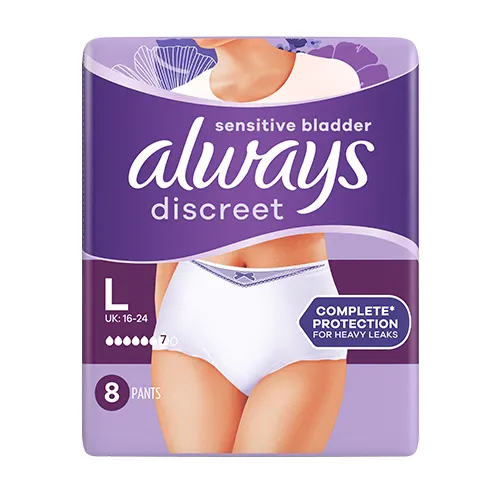
Whether it feels like it’s a long way off, or if the signs have started and you’re expecting it imminently, find out all you need to know about the menopause here. It may no longer be such a taboo subject, but there are still myths and misinformation about it, so here’s a no-nonsense guide to it.
Table of content:
What is menopause?
Menopause is the time in a woman’s life when ovulation and menstruation stop and the reproductive phase ends. This usually occurs between the ages of 45 and 55. Menopause is defined as the cessation of menstrual periods for 12 consecutive months after age 50 and 24 months below 50, as a result of the decline in ovarian function and the associated decrease in the production of oestrogen and progesterone. Many physical and emotional changes occur during this phase. Women may first experience some pre-menopause symptoms such as hot flashes, night sweats, mood changes, and sleep disturbances. They may continue for several years before gradually subsiding. However, such signs of menopause do not have to affect your quality of life.
It’s considered early menopause if it happens before the age of 45 and premature below age 40. The causes of early menopause can be natural, when the ovaries stop making certain hormones (especially oestrogen), or surgical, when the ovaries are removed. Cancer can also be one of the causes of early menopause insofar as the two main treatments for it – chemotherapy and radiotherapy – can cause premature ovarian failure. There is also a strong genetic link to menopause timing.
What are the signs and symptoms of menopause
When a woman’s periods stop this is called menopause. The ovaries gradually stop producing oestrogen and ovulation ceases. This usually occurs around the age of 50 but there are no hard and fast rules. The reduction in the production of oestrogens does not only affect the menstrual cycle but also body temperature, mood and bone and ligament health and many other functions from “top to toe”. So, what are the symptoms of menopause? The first signs of menopause can be both physical and emotional. The early menopause symptoms usually vary in severity and duration, and not every woman experiences all of them. Hormone changes sometimes also lead to more unusual menopause symptoms like tinnitus. In general, managing menopause signs can be challenging, but there are a variety of treatment options available, such as lifestyle changes, hormone therapy and alternative therapies. The wide range of menopause symptoms include the following:
1. Changing periods
Often the first sign that a woman is entering the perimenopause is that her periods start to change. These changes could be in either or both frequency and flow – they could become heavier or lighter and occur more or less often.
Sometimes, women think that their period has stopped and then it suddenly starts again. During this stage, cycles are very difficult to predict. This is completely normal, but see your doctor if bleeding lasts for longer than a week, happens more than every three weeks or is so heavy that it soaks through a tampon or pad in 2 hours or less. If you wish to avoid pregnancy, continue using contraception.
2. Hot flushes and night sweats
These are probably the best-known signs of the menopause, when a sudden feeling of intense heat spreads throughout the body, seemingly from nowhere. Night sweats occur when they happen during sleep. Some women can experience them several times a day, while others only have them occasionally and aren’t really bothered by them. They usually start a few months before menopause and last for up to 8 years.
The exact cause of hot flushes and night sweats during menopause is not fully understood, but they are thought to be related to the hormonal changes that occur at the time. As oestrogen levels decrease, the hypothalamus, which regulates body temperature, may become more sensitive to small changes in temperature, which results in hot flushes and night sweats. Dizziness and palpitations often accompany these symptoms as well.
3. Sleep problems
Insomnia can be one of pre-menopause symptoms, with some women finding it difficult to either get to sleep or stay asleep throughout the night. Others find that their sleep is interrupted by night sweats. Sleep problems are not unusual and can be caused by a variety of factors, including hormonal changes, hot flushes and night sweats, and anxiety.
It's important to address sleep disturbances during menopause, as lack of sleep can lead to a range of health issues, including fatigue, mood changes, and decreased quality of life. Women experiencing sleep problems should consider some natural remedies for menopause or speak with their healthcare provider to determine the best course of action for their individual needs.
4. Lower libido
It’s not an inevitable sign of the menopause, but some women find that their sex drive reduces significantly during the menopause. This could be because of the lower levels of the sex hormones oestrogen and testosterone in the body during the perimenopause and menopause, but for some it could just be due to other menopause symptoms, such as anxiety, vaginal dryness or chronic fatigue.
There are several strategies that can be helpful to manage lower libido during menopause, such as practicing good self-care habits such as eating a healthy diet, exercising regularly, getting enough rest, and managing stress levels. Engaging in regular sexual activity can also help increase libido, as can exploring new sexual experiences and communicating openly with a partner.
5. Hormone headaches
Changing levels of hormones in the body particularly declining oestrogen level can lead some women to experience ‘hormone headaches. These can happen just before and during the first couple of days of a period, during pregnancy and can also be one of the signs of menopause.
Hormone headaches can be characterized by a throbbing pain on one or both sides of the head, sensitivity to light and sound, and nausea or vomiting. They can be challenging to manage, but there are some remedies that prove to be helpful. Such solutions for menopause headaches include over-the-counter pain relievers such as ibuprofen or acetaminophen, prescription medications such as triptans or ergotamines, and preventive medications such as beta-blockers or antidepressants for others, hormone replacement may be the only effective solution.
6. Mood changes
Menopause can impact mental health as much as physical health. It’s not uncommon for one of the early menopause symptoms to be mood swings – you could feel anxious, depressed, irritable, or tearful for no reason, due to the hormone fluctuations in the body.
This is because hormonal changes taking place during menopause can impact the balance of chemicals in the brain that regulate mood, such as serotonin and dopamine. In addition, the physical symptoms of menopause, such as hot flushes and sleep disturbances, can also contribute to mood changes. It should be noted that not all women will experience significant mood changes, even though it is one of the commonest symptoms.
7. Vaginal dryness
Hormones control levels of vaginal discharge, so when hormone levels change during the menopause it can lead to vaginal dryness. Because oestrogen helps to maintain the health and elasticity of vaginal tissue, the decrease in its production can cause the vaginal tissue to become thinner, drier, and less flexible. This can lead to itchiness, and sex becoming uncomfortable or painful, and could contribute to lowering the libido.
In addition to the above-mentioned physical discomfort related to vaginal dryness, it can also have emotional consequences. Women may feel embarrassed or self-conscious about their symptoms, which can lead to a decrease in sexual confidence and self-esteem.
8. Urinary Tract Infections
Some women find that they begin to experience infections of the bladder, kidneys, or urethra once they are in perimenopause, and they can be recurrent. Again, it can be due to the lack of oestrogen, which is vital to preserve the strength and flexibility of pelvic and bladder tissue. When oestrogen levels decrease, the tissue in the urinary tract can become thinner, drier, and less elastic, making it more susceptible to infection.
The symptoms of Urinary Tract Infections include pain or burning during urination, frequent urination, urgency to urinate, and cloudy or strong-smelling urine. Some women may also experience lower abdominal pain, fatigue, or fever. If left untreated, such infections can result in more serious complications, such as kidney infections, so it's important to seek medical treatment if symptoms are persistent.
9. Muscle and joint changes
Experiencing stiff joints and muscular aches and pains could just be a part of getting older, but it could also be a sign of the menopause. In turn, women who have gone through the menopause can be at a greater risk of developing conditions such as osteoporosis, which is characterised by weak and brittle bones that are more prone to fracture.
Again, the reason for these symptoms is the lack of oestrogen. It helps to maintain bone density and muscle mass, so the decrease in oestrogen levels during menopause can deteriorate bone density and muscle mass, which can result in muscle and joint pain. Oestrogen also promotes collagen in joints, tendons a ligament which is essential for flexibility.
10. Palpitations
Being suddenly more aware of what your heart is doing could be a sign of the menopause. You might notice it pounding, fluttering or beating irregularly for a few seconds or minutes. Physically, this is again caused by hormone changes, but it could also have emotional or psychological triggers such as stress or anxiety. Given that the body is going through so many changes, it’s unsurprising that the menopause can be a stressful or anxious time for some Medicines have been developed to combat and prevent many of these menopause symptoms. Please speak to your medical practitioner if you need help in this new phase you are entering.
Finally, it is worth mentioning that some women may experience some more unusual menopause symptoms, such us burning tongue, body odour, gum disease, or formication.
How long do symptoms of menopause last?
The duration of menopause symptoms can vary widely among women. Some of them experience the signs of menopause for just a few months, while others are affected by them for several years. On average, menopause symptoms may last for approximately 8-10 years, although in some cases it might be even longer. While the signs of menopause can be uncomfortable and disruptive, they are typically temporary and can be managed with a variety of treatment options.
The duration of symptoms can be influenced by a variety of factors, including the individual’s genetics, lifestyle, and overall health. Women who have a history of depression or anxiety, for example, may be more likely to experience mood changes during menopause, and may find that these symptoms last for a longer period of time. The type of menopause that a woman experience can also have an impact on the duration of symptoms. Women who undergo surgical menopause, in which the ovaries are surgically removed, may suffer from more severe and long-lasting symptoms, as the sudden decrease in hormone levels can be more dramatic.
6 natural remedies and lifestyle changes for menopause symptoms
While menopause is a natural process and not a medical condition, such symptoms can significantly affect a woman's quality of life. Fortunately, there are solutions for menopause symptoms that can help manage the intensity and frequency of these unpleasant changes. By making lifestyle changes and using natural remedies, women can reduce symptoms of menopause without the need for medication or invasive treatments.
1. Exercise
Even before menopause, you’ve probably experienced the mood-boosting effects of exercise, and noticed how it can tire you out and help you sleep better. It might seem counterintuitive, but studies show that getting hot and sweaty with a workout can actually help ease hot flushes too. Physical activity releases endorphins, which are natural chemicals that promote feelings of well-being and mitigate stress. Getting regular exercise can also help keep bones in good health too. Nothing too strenuous though, as that could set off palpitations! Even moderate exercise, such as walking or swimming, can be good natural remedies for menopause symptoms.
2. Reduce stress
No matter what your age or life stage, reducing stress levels can help improve your physical and mental health. Worries can keep you up at night, so learning to manage them can help with sleep and other signs of menopause like anxiety, low libido, hormone headaches and mood swings. Menopause itself can be a stressful experience due to the physical and emotional changes that come with it.
One of the most effective ways to reduce stress is through relaxation techniques. Meditation, deep breathing exercises, and yoga are all proven methods for reducing stress and promoting relaxation. These techniques can help calm the mind and reduce anxiety, allowing women to manage their menopause symptoms with greater ease.
3. Stop smoking
There are plenty of good reasons to quit nicotine as it is, and helping with signs of menopause is yet another to add to the list. Smoking is a well-known risk factor for a variety of health conditions, such as cancer, heart disease, and respiratory illness. It also impacts the balance of hormones, which is the last thing you need during menopause when hormones are already in flux. Stopping smoking can help improve bone health, increase libido and ease hot flushes. It could also help stabilise your mood and reduce the risk of depression and anxiety during menopause.
4. Avoid caffeine, alcohol and spicy food
Caffeine and alcohol can disrupt sleep, so it’s best to steer clear if you have menopause-related sleep problems. Caffeine is a stimulant that can increase heart rate and body temperature, exacerbating hot flashes and night sweats. Consuming caffeine, especially in the evening, can also disrupt sleep, leading to fatigue and mood swings. Alcohol is another substance that can trigger and exacerbate hormonal symptoms, like hot flushes and night sweats. Spicy food can do this too, so is best avoided.
This means that steering clear of caffeine, alcohol, and spicy foods during menopause can help reduce the intensity and frequency of some of menopausal symptoms. Women can improve their comfort during this transition by consuming a balanced diet rich in whole grains, fruits, vegetables, and lean proteins while getting rid of foods and drinks that could intensify symptoms. Such dietary changes can bring greater comfort and ease during menopause.
5. Eat calcium and Vitamin D
As well as cutting out certain things from your diet, watching what you eat, and drink can help make it easier to deal with other signs of menopause too. It’s important to maintain bone strength during and after menopause and including Vitamin D and calcium can help with this. Women going through menopause should aim to consume at least 700 - 1000 mg of calcium per day through their diet or supplements. When it comes to Vitamin D, you should aim to intake at least 600-800 IU every day. Foods that are high in calcium include dairy products such as milk, cheese, oily fish and eggs, while Vitamin D can be found in dairy products, nuts and green leafy vegetables. .
6. Wear natural fabrics
Choose nightwear made of natural fabrics such as cotton and linen. They are lightweight and breathable, allowing air to circulate around the body and reducing the likelihood of overheating. In addition to feeling nicer against the skin, they have some moisture wicking properties that will keep you more comfortable during night sweats. Wearing pure cotton underwear, rather than synthetic, can help prevent UTIs.
In contrast, synthetic fabrics such as polyester, nylon, and rayon are less breathable and can trap heat and moisture against the skin, exacerbating hot flashes and night sweats. These fabrics could also irritate the skin and cause discomfort.
- If you are going through menopause or experiencing bladder leaks, always make sure to consult your doctor or a health specialist for these medical conditions.
- Always Discreet products are not products to help with menopause, but medical devices for bladder leaks, which may be a symptom experienced by some women during menopause.






